|
|
|
Sort Order |
|
|
|
Items / Page
|
|
|
|
|
|
|
| Srl | Item |
| 1 |
ID:
113176
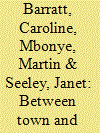

|
|
|
|
|
| Publication |
2012.
|
| Summary/Abstract |
In Uganda, as in many other African countries, increasing numbers of 15-24 year olds are migrating to urban areas to look for work and educational opportunities. We explore the shifting sense of identity amongst youth migrants in Uganda as they struggle to reconcile the differences in social norms between the rural settings in which they are brought up and the urban environment in which they now live. The experience of migration significantly impacts on the transition from youths to adults by influencing their perception of their own identity as well as the expectations of society. Young people often hold conflicting views of their rural and urban experiences, suggesting that understanding rural and urban realities as distinct entities does not reflect the complex relationship, and possible confusion, of the migrant experience. In contrast to existing literature on migrant identities, which has tended to focus on the identity shift experienced by adult transnational migrants, this reveals the particular challenges faced by youth migrants whose adult self is not yet formed.
|
|
|
|
|
|
|
|
|
|
|
|
|
|
|
|
| 2 |
ID:
113178
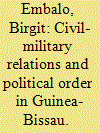

|
|
|
|
|
| Publication |
2012.
|
| Summary/Abstract |
Since independence in 1974 the military of Guinea-Bissau have succeeded in controlling the political system, even attempting to impose their rule directly in the aftermath of the 1998/9 war. What makes the analysis of civil-military relations and political order in contemporary Guinea-Bissau particularly challenging is the overlapping of political, ethnic and personal considerations of the politico-military elite and their fluctuating and ambiguous short-term alliances. Guinea-Bissau's armed forces include an amalgam of veterans, claiming historical legitimacy from the liberation war, and officers who use their positions for personal gain rather than furthering democracy and national interests. This article examines the logic of civil-military relations against the heterarchical political figuration and the specific character of the politico-military elite of Guinea-Bissau.
|
|
|
|
|
|
|
|
|
|
|
|
|
|
|
|
| 3 |
ID:
113175
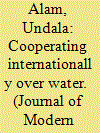

|
|
|
|
|
| Publication |
2012.
|
| Summary/Abstract |
Since the early 1960s, Guinea, Mali, Mauritania and Senegal have cooperated over the Senegal river. Contrary to the norms of managing international rivers, the riparians have subjugated their sovereignty and incurred national debt to jointly develop the benefits from their shared river, despite intra-basin tensions and conflict. The Senegal experience highlights an alternative path to tackling the consequences of climate change, poor water management and increasing demand. In seeking to explain the intensity of international cooperation displayed in the basin, this article examines the characteristics of international rivers and the Senegal basin's history, and concludes that Pan-Africanism, francophonie and the political leaders' attitudes to regional cooperation shaped l'espace OMVS.
|
|
|
|
|
|
|
|
|
|
|
|
|
|
|
|
| 4 |
ID:
113180
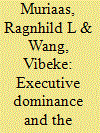

|
|
|
|
|
| Publication |
2012.
|
| Summary/Abstract |
Quota policies securing the presence of marginalised groups in decision-making bodies have been adopted across sub-Saharan Africa. These policies are frequently understood through the lens of a pluralist perspective. This stance is not appropriate in African regimes characterised by executive dominance. Through a qualitative study of official documents, newspaper articles and interviews conducted during two field studies in Uganda in 2005 and 2010, this article shows how the understanding of quota policies in Africa may gain from the corporatist debate on interest representation. The analysis reveals that the incumbent National Resistance Movement has employed the reserved seat policy strategically to maintain its dominant position, and that strategies for using the quota system have evolved gradually over time in response to key political events, and the interests of group activists at the local and national levels with vested interests in its survival.
|
|
|
|
|
|
|
|
|
|
|
|
|
|
|
|
| 5 |
ID:
113177


|
|
|
|
|
| Publication |
2012.
|
| Summary/Abstract |
HIV/AIDS policies have become a significant and controversial issue in Mozambique in recent years. The extent of the disease, along with a massive involvement of the donor community and a committed response by Mozambican authorities, are the main drivers of these policies. In the framework of the new aid architecture, donors are expected to encourage recipient country 'ownership' of development policies through new aid instruments like budget support or sector-wide approaches. However, HIV/AIDS policies in Mozambique are highly influenced by donors, because an exceptionally high proportion of the financial resources and policy formation comes from them. In this article we assess the extent of HIV/AIDS and its effects in Mozambique, and analyse the successes and shortcomings of the policies to fight the disease, emphasising the role of donors. We end by exploring possible ways to increase ownership and effectiveness.
|
|
|
|
|
|
|
|
|
|
|
|
|
|
|
|
| 6 |
ID:
113179
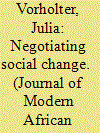

|
|
|
|
|
| Publication |
2012.
|
| Summary/Abstract |
A common claim, in public discourses and in post-colonial theory, is that colonialism, and more recently the aid industry and the media, have created global hegemonic norms, which have been enforced on non-Western societies. While this may be true in some respects, this article takes a different stance on the debate. It scrutinises perceptions of Western-influenced social change in Uganda, and differentiates between discourses on Westernisation and discourses on neo-colonialism. Both are analysed as forms of social critique - one internally and the other externally oriented. The largely elitist discourse on neo-colonialism is explicitly critical of the West and its interventions in Uganda. But it is not representative of the more ambiguous perceptions of Westernisation among 'ordinary' people, who use references to the West to comment on contemporary Ugandan society. The article is based on empirical research in Northern Uganda. It focuses on discourses on gender, kinship and sexuality, and the recent debate on homosexuality.
|
|
|
|
|
|
|
|
|
|
|
|
|
|
|
|
|
|
|
|
|